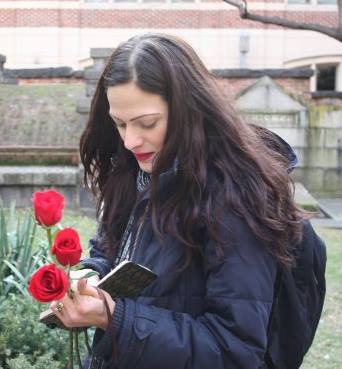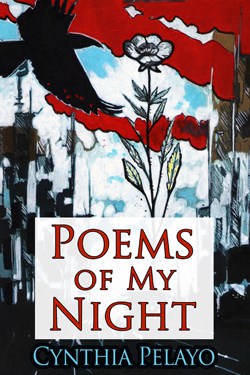Interview with Cynthia (Cina) Pelayo
Cynthia (Cina) Pelayo is an International Latino Book Award winner. She is the author of Loteria, Santa Muerte, and The Missing and holds a Master of Fine Arts from The School of the Art Institute of Chicago. She lives in Chicago with her husband and son.

With the publication of her new collection, POEMS OF MY NIGHT, Cynthia Pelayo constructs a narrative in her poetry in response to the work of Jorge Luis Borges that examines the themes and subsequent consequences of insomnia, death, and blindness.

To help celebrate the release of this fascinating collection, the HWA Poetry Page is proud to present an interview with Cynthia Pelayo:
HWA: What’s your favorite Jorge Luis Borges poem?
CP: Almost A Last Judgement – This poem brings me comfort, even though it comes from such a sad place. It talks about a person who has walked the streets, who has felt loneliness but has felt the comfort of their ancestors, yet they live with terror and have to find beauty in that. That speaks to me wholly. Living in Chicago has never been easy, nor is being a second generation Hispanic. I feel neither here nor there. I’m not truly accepted by those in my ancestral home. I’m not truly accepted here on the mainland. I’m neither here nor there. No matter where I am I feel like an outsider, not welcome, not wanted, and so I’m always outside looking in.
Almost A Last Judgement
My doing nothing as I walk the streets lives on
and is released into the night’s multiplicity.
The night is a long and lonely celebration.
In my secret heart I justify and glorify myself.
I have witnessed the world; I have confessed to the strangeness of the world.
I’ve sung the eternal: the bright returning moon and the faces craved by love.
I’ve recorded in poems the city that surrounds me
and the outlying neighborhoods tearing themselves apart.
I’ve said astonishment where others said only custom.
Faced with the song of the tepid, I ignited my voice in sunsets.
I’ve exalted and sung my blood’s ancestors and the ancestors of my dreams.
I have been and I am.
I’ve fixed my feelings into durable words
when they could have been spent on tenderness.
The memory of an old infamy returns to my heart.
Like a dead horse flung up on the beach by the tide, it returns to my heart.
And yet, the streets and the moon are still at my side.
Water keeps flowing freely in my mouth and poems don’t deny me their music.
I feel the terror of beauty; who will dare condemn me when this great moon of my solitude forgives me?
–Jorge Luis Borges
HWA: How’d the idea for this collection come to be? What was your process to ‘respond’ to each poem?
CP: I finished reading Jorge Luis Borges’ Poems of the Night one evening – and this was the second or third time I had read the collection, and finally I felt like I understood his despair. Borges was going blind and went totally blind later in life and that’s a terrifying thing. His collection deals with death, blindness and terror, and I knew I could relate to all of those things. My father became half blind after a second stroke and the thought of him going blind and not being able to see me one day made me very emotional. It wasn’t just blindness, but thoughts of loneliness, darkness, despair and death – all of it wrapped up. Since I felt so connected to Borges’ poems I sat down and began responding to them, each one. It was therapeutic for me because for the first time, probably ever, I felt like I could tell someone all of the things that really scared me.
HWA: What’s your favorite poem from this collection?
CP: Casa juicio final – it’s my love letter to Chicago. Here I tell her how much I hate her, how much I feel like she’s ruined me but also how much I love her and how I know I’ll never leave her. Chicago is such a strange city. It’s two cities. It’s the north side and the south side. It’s the rich side and the poor side, but I live in the west side, so even geographically I’m neither here nor there. In Chicago, and I’m sure this is the case in so many areas, but your zip code, where you grew up and where you went to school have already written so much of your future. People who live here who “made it” so to speak out of poverty and away from a life of crime, we feel like it’s almost a badge of honor to look back at the harsh realities of the city and say ‘I beat you. I did not let you defeat me.’ Although, that’s relative because you never know what’s going to happen to you when you leave your house. Tragedy happens in the most beautiful of places in this city and it’s gut-wrenching.
Casa juicio final
These city streets are more than my angels, they are my blessed demons
They’ve refrained from stabbing daggers into my back but instead have jammed
ice picks in my eyes forcing me never to blink
All I see is blood running and it runs now on cold, soulless asphalt
Where I’ve walked I’ve wondered if others have felt my anguish
These were steps I sat down on once to cry
The trembling you feel when you walk up those stairs are mine
This city has given me loneliness wrapped in wicked misery
I kiss her goodnight each night and each morning she embraces me with her rusted hope
We are a domestic abuse the two of us and she knows that I will not abandon her
I want to walk her nighttime city streets but she keeps me inside
Lions and cobras lurk behind parked cars and in dark alleyways
Sometimes you can see spray painted warnings begging intruders to turn away
“Here be dragons”
I’ll wait until it is safe, which it will never be, but still I will never leave her
–Cynthia (Cina) Pelayo
HWA: How should the reader unfamiliar with Borges read this collection? Do you recommend reading Borges first?
CP: I think you can certainly read my collection before delving first into Borges. Borges’ short stories are pretty cerebral. I would recommend his poetry first for a new reader. I gravitated to Borges after I learned of his fondness for Edgar Allan Poe. He was a brilliant academic, and like Poe, Borges focused primarily on poetry and short fiction.
HWA: I think, for me, the intimacy and immediacy of ‘Maestro’ really struck a chord as it wrapped up the first part of your collection. Is there a story behind that poem?
CP: Maestro concluded the response to Borges’ poetry collection Poems of the Night. I wanted to do something with this final poem to thank him. I’ve written short stories and novels but this is the most personal my writing has ever been and I could not do that without Borges, and so it was my thank you to him.
Maestro
Grand Maestro, I’ll call you this, right now in hopes that you hear me. I’ll send my prayer to you, through dream dusted night, sprinkled with true nightly terrors that we’ll never repeat to the living. Walls have stopped me from dictating this word, this single word if uttered will lead the minotaur to me. Beasts kill savagely, poetically. This violence is in the nature of the labyrinthine world. Some nights I wake myself in a panic, finding myself in a darkened room and that second before my eyes adjust to the darkness I wonder if I have gone blind and I slip into the reasoning of navigating the seas without the sun’s reflection. It’s either my panic, my eyes, or the patron saints that give return to me the pity of sight. Will they ever one day forget to return it? You can suffocate with oxygen. You can drown without water. His footsteps are growing closer now, the bull-headed creature sent to destroy me for my vision. Part man. Part bull. Dante found him in his inferno, this monster whose entire zone is violence. His shadow creeps upon the wall now. Horns peak behind the curtain. Raging black eyes find victory in this, my fear. I call upon my saint, my savior, my only hope for survival. “I beg you to please come save me. Come find me, Borges!”
–Cynthia (Cina) Pelayo
HWA: Finally, with the shift from Part 1 to Part 2, how did you decide on that particular presentation of the poem? What’s the connection between the two parts beyond Borges and, of course, you?
CP: This switch was a bit tricky. There was a disturbance when I concluded the first part because the collection did not yet feel complete. Part 1 responds to poetry only from Borges’ Poems of the Night. In Part 2, I had to do some investigative work and went on to read Borges’ entire collected poetry and there were just hundreds of poems. It took me some time to select the poems I wanted to respond to for Part 2 that felt connected to those in Part 1. Part 2 contains pieces that skew a little towards prose, but ultimately they deal with the same themes in Part 1 and that is what I was hoping to accomplish.
It almost felt like the right thing to do. Borges loved puzzles and especially this idea of a labyrinth. It almost felt like I was thrown into one of Borges’ fictional detective short stories trying to locate clues and piece something together. So concluding the collection this wave felt right.
For more on Cynthia (Cina) Pelayo: http://www.cinapelayo.com
For more on Jorge Luis Borges: https://openlibrary.org/authors/OL18928A/Jorge_Luis_Borges
To purchase Poems of My Night: http://rawdogscreaming.com/books/poems-of-my-night/



